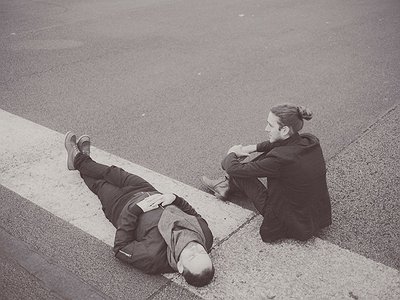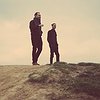Collaborations can take on many forms. What role do they play in your approach and what are your preferred ways of engaging with other creatives through, for example, file sharing, jamming or just talking about ideas?
BEN: Due to my lack in theoretical and practical music making I really appreciate if I can learn something from a fellow musician. I’m experienced in editing and sound design-based composing but I could never play an instrument with the same confidence. I’ve always preferred a distant approach to music - recording and brainstorming together is always wonderful and inspiring however, I focus and work best when I’m completely alone.
SEB: I don’t have a preferred way when it comes to collaborating with someone, I think it's a matter to let the process take you from the very start and never force things to happen. It's very beautiful when the working process gets its natural flow; this is when collaboration is most enjoying.
Could you take us through a day in your life, from a possible morning routine through to your work? Do you have a fixed schedule? How do music and other aspects of your life feed back into each other - do you separate them or instead try to make them blend seamlessly?
BEN: As my studio is in my home/apartment it’s hard to separate. Depending on what the schedule looks like the day begins early, with coffee and an overview on what needs to be done that day. This can be remix- commercial-, or personal work. When I’m at home I’m normally also always in work-mode which is why I avoid being a „mobile musician“ as best as I can. I love that when I close the door and go outside I try to think as little about actual work processes as possible and just take in what this outside world offers.
SEB: I work on different schedules depending on the work I have to get done. I will share here that cooking does take an important role in my daily life.Then, when it comes to making music, time or schedule are all gone and dinner time is most likely to happen at 5 or 6 in the morning :D
Could you describe your creative process on the basis of a soundtrack or game that's particularly dear to you, please? Where did the ideas come from, how were they transformed in your mind, what did you start with and how do you refine these beginnings into the finished work of art?
BEN: Normally I read the story(board), watch footage of a movie, play the playable parts of a game etc, preferably without any kind of reference music. This helps me set the mood and find the right tone for the project a lot better. After that I think about the instrumentation and try to find its sonic identity, if you will. For the film Mother Nature, the elements needed to be quite raw and heavy, somewhat unrefined to sound right, while Everything needed to be a lot less specific and yet still have a kind of signature in nature. This takes a while but once these two steps are completed, I get my tools for the project (until any kind of further notice) and focus on writing.
SEB: It starts from understanding the concept and feeling behind the work and then taking on a close collaborative approach with the other party. The concept and overall project has to be inspiring from the beginning and I trust this force to lead me along the way.
There are many descriptions of the ideal state of mind for being creative. What is it like for you? What supports this ideal state of mind and what are distractions? Are there strategies to enter into this state more easily?
BEN: That’s hard to answer. It’s easier to determine when I’m not very creative or when I feel nothing worth writing down is happening. I should generally not be in a stressful state but other than that every moment and (almost any) state of mind has the potential to be a good compositional moment.
SEB: I strongly believe that inspiration or any ideal state of mind will find you working.
How do you see the relationship between the 'sound' aspects of game music and the 'composition' aspects? How do you work with sound and timbre to meet certain production ideas and in which way can certain sounds already take on compositional qualities?
BEN: Sound IS music and vice versa. I don’t try to overthink these aspects. If a certain sound lends itself to be the composition I would never force an actual composition over it simply because I believe a tone, a sound a single something can be the composition needed sometimes. That being said, sometimes a cacophonic overlay of many sounds can be just what’s needed. The importance and meaning, or rather answer, to this question depends completely on what the project needs in the eyes of the composer and / or director.
SEB: Ben said it; sound is music! For what is commonly understood as sound, it can at times, certainly inspire great musical ideas.
Our sense of hearing shares intriguing connections to other senses. From your experience, what are some of the most inspiring overlaps between different senses - and what do they tell us about the way our senses work? What happens to sound at its outermost borders?
BEN: To be honest, I know what you mean and confess I have never thought about this too much, hence my answer might be a little dull. Most of the time, the music I enjoy is so powerful to me that the other senses are rather dimmed than heightened, simply because I focus so much on it. In regards to live shows and the combination of sensory events I have not found and answer at all.
SEB: I have been always so captivated by the psychological impact that music can have sometimes, I think Arvo Pärt is a clear example of this. On a personal experience, music does trigger many senses, this being the reason I have been drawn to making music from an early age; it's a need.
Art can be a purpose in its own right, but it can also directly feed back into everyday life, take on a social and political role and lead to more engagement. Can you describe your approach to art and being an artist?
BEN: For me, art is obviously a result of the world we live in so technically it can’t be unpolitical but real life and political contexts are no direct inspiration for me. Art and music are much more escapism than anything else so this is where it comes from and where works best for me.
SEB: I believe it is the essence behind the creator’s approach that makes art, art. It would be impossible knowing what the author felt when creating a piece of art and then there is this aspect of essence which I feel one can trust when experiencing a piece of art.
It is remarkable, in a way, that we have arrived in the 21st century with the basic concept of soundtracks still intact. Do you have a vision of music, an idea of what gaming music could be beyond its current form?
BEN: Not a vision, but a wish is closer to it. I do believe though that the development will be natural along the lines of its current time. For the next few year, anything related to VR will obviously be of significance and I could also imagine that we might find scores getting a little less functional (a lot of games offer a very functional score that don’t feel very inspired but much more constructed) and a bit more compositional as well as much more daring. If I were to signal a probably impossible wish to game companies and developers I’d say: open up and dare a lot more. Avoid clichés. All the options and composers are there - let them contribute and trust them more, rather than utilizing their skills for a compliant and tame result.
I would say something similar to composers (and include myself in this completely): Be brave - understand the project, bond with it, develop a first idea and abandon this first idea immediately as this was apparently the first best thing you could think about - start from scratch and see where avoiding the structure of this first idea will lead you.
SEB: I also don’t a vision about this. What I simply dislike is how, and depending on the market, soundtracks can sometimes feel so dull and always sound the same. This is of course a market that needs to comply with commercial standards but what I dislike is the lack of personality behind these creations.



